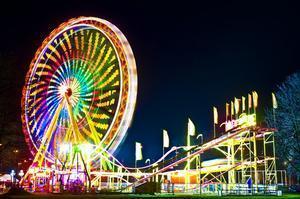 Over this past summer, two major amusement park accidents made national headlines. In early June, four individuals were injured when a roller coaster at Six Flags Magic Mountain in California hit a tree and partially derailed. Almost a month later, a cable on a swing ride snapped at Cedar Point amusement park in Ohio. This incident resulted in two injuries. These two accidents caused both amusement park patrons and safety experts to question the safety of America’s amusement parks and analyze what must be done to reduce the number of amusement park accidents.
Over this past summer, two major amusement park accidents made national headlines. In early June, four individuals were injured when a roller coaster at Six Flags Magic Mountain in California hit a tree and partially derailed. Almost a month later, a cable on a swing ride snapped at Cedar Point amusement park in Ohio. This incident resulted in two injuries. These two accidents caused both amusement park patrons and safety experts to question the safety of America’s amusement parks and analyze what must be done to reduce the number of amusement park accidents.
When amusement park attractions malfunction, serious, catastrophic injuries can result. For instance, when an attraction at Six Flags Kentucky Kingdom malfunctioned and cables used to support the ride came loose, a young girl’s feet were severed. Other injuries can include broken bones, strains and sprains, neck and back injuries, and (in extreme cases) loss of limbs. It is important for amusement park patrons to know that amusement parks can be held responsible for patrons’ injuries.
Premise Liability and Theme Parks
When any business opens its doors to the public, that business owes a duty of care to those customers that come onto the business’s property. Amusement parks are no different. An amusement park owner must take steps to safeguard its property by inspecting the grounds and rides, identifying potential dangers or hazards (such as wet floors, defective rides, etc.) and taking measures to either correct these problems or warn visitors about them. For instance, a spilled ice cream cone or ice cubes on a walkway should be cleaned up promptly; otherwise, the amusement park may be liable if a visitor slips and falls, injuring her arm or hip.
If an injury does occur at an amusement park, the owner will be held liable for the patron’s injuries if it is shown that the park owner acted carelessly in identifying hazards and protecting the park’s visitors from those hazards. Evidence that other patrons had complained about injuries or soreness after a ride, that routine safety checks had not been completed on schedule, or that the park had not hired enough qualified and trained employees to regularly walk the park and clean up spills can all be useful in showing negligence.
Contact a Connecticut Premises Liability Lawyer
There is more to a premises liability case than just showing the amusement park owner or other property owner was negligent; there must also be evidence showing that negligence caused the visitor’s injury or injuries. Holding a property owner liable for your injuries–especially well-funded property owners like amusement park owners–requires the skills of an experienced Hartford premises liability attorney. The attorneys at Woolf & Ross Law Firm, LLC can help you recover compensation for your injuries. Call us today at 860-290-8690, or toll free, at 800-923-0557 for a free consultation.
 50 Founders Plaza
50 Founders Plaza

